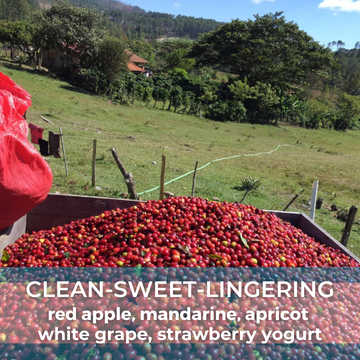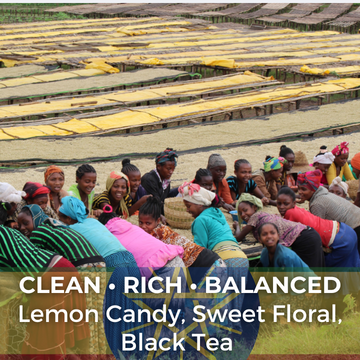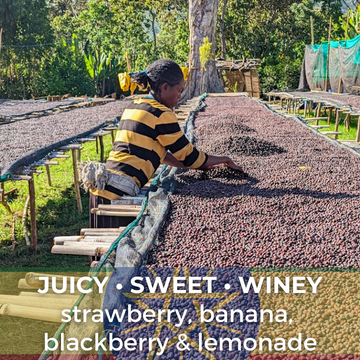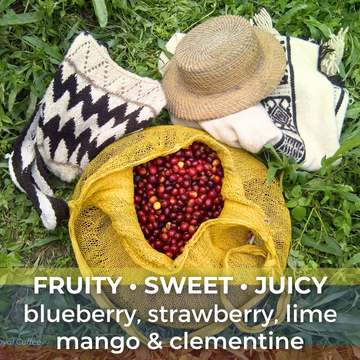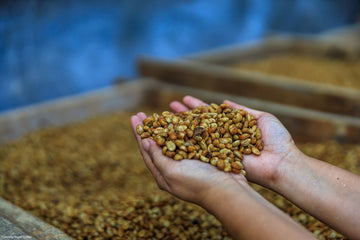Sold Out
Tanzania Ngorongoro Finagro Estate Citric Carbonic
This micro lot from Neel and Kavita Vohora brings a LOT to the table and it’s also our very first co-fermented offering! They have developed a unique processing method which they call “Citric Carbonic”. Despite the intense fermentation, this coffee is exceptionally clean. It's full of big citrus flavors most notably orange, along with tangy pineapple, fresh kiwi, raspberry, and hibiscus. It's refreshing, silky smooth and sweet, this coffee is purpose built for summertime.
This micro lot from Neel and Kavita Vohora brings a LOT to the table and it’s also our very first co-fermented offering! The Vohora siblings are truly a dynamic duo and have developed a unique processing method which they call “Citric Carbonic”. It’s fermented once in a sealed, carbon dioxide rich environment with citric acid for 2 to 4 days before being flushed, then fermented again and fully washed conventionally. Again, there’s a LOT going on in this experimental processing so let’s break it down piece by piece.
First, this coffee is fermented using carbonic maceration. This method is borrowed from the wine industry and involves placing the coffee cherries in sealed containers for fermentation. Next, carbon dioxide is injected into the chambers. Much like other forms of anaerobic fermentation, this CO2 rich environment activates different microbes than say, an oxygen rich environment. The difference between this and anaerobic is that the CO2 forces the fermentation to occur inside the actual coffee cherries, rather than just on their exterior. Then these microbes go to work breaking down, intensifying and releasing tasty flavor compounds in the coffee cherry fruit. Since everything is in a sealed environment and coffee beans are very porous, those tasty compounds get absorbed by the beans for us to enjoy later.
The Vohora siblings add one additional ingredient to this happy slurry: citric acid. This citric acid is found naturally in, you guessed it, citrus fruits like lemon, orange and lime. This concept of “co-fermenting” coffee cherries with other natural ingredients is a growing and slightly controversial trend. When done correctly and especially in an enclosed environment like an airtight chamber (a la this coffee), the added ingredient imparts a TON of flavor to the coffee beans. This is just like how the flavors from the coffee cherry are imparted to the beans as it’s broken down due to fermentation or drying if the coffee is natural processed. So while some may argue it’s “cheating” by adding flavor to the coffee, it’s no different than what’s happening in all forms of coffee processing. For us, we figure it’s another cool innovation to coffee processing and we love trying new things, especially when the results are this tasty! And don’t worry, all that citric acid gets washed off before the beans are even removed from the coffee cherries so when you roast this coffee, it’s just coffee in your roaster.
Speaking of tasty, no matter which side of the debate you land on co-fermentation, I really recommend giving this coffee a try because it’s a treat! You can really taste the intent behind the processing, especially at light roasts and with plenty of rest (see the “Roasting Notes”). Since the remainder of the processing was finished fully washed, we thought the flavor would be more subtle but it’s very present. In fact, despite being a huge fan of naturals, I think a natural version would be too intense! The biggest note we got was citrus (obviously) in the form of orange. But not orange juice, more like orangeade, like the sports drink, but without the artificial flavor! Next up was ripe raspberry along with tangy pineapple and fresh kiwi finished with lovely hibiscus. Despite the intense fermentation, this coffee is exceptionally clean with no fermenty or vinegary flavors present in our roasts. Refreshing, silky smooth and sweet, this coffee is purpose built for summertime. If you’d like the try the Vohora’s handiwork in a more approachable format, check out their conventional washed peaberry offering as well!
Reminder! This coffee is raw, you must roast it before brewing
Arrival Date: July 21st, 2023. US Arrival: May 2023, packed in AgroZ hermetic bag.
Acidity & Brightness: Zesty and very sweet
Balance & Finish: Moderately balanced with clean, floral finish
Body & Texture: Full bodied, smooth and silky
Flavors: Orangeade, raspberry, pineapple and kiwi
Grade:AA/AB blend (15+ screen), Grown at 1600-1800 masl
Certification: Rainforest Alliance
Processing: Carbonic maceration (sealed barrels with CO2 added, oxygen flushed) for 2-4 days, co-fermented with citric acid added. Then depulped and fermented again in traditional fully washed method. Finally, washed and dried on raised bed.
Grower: Neel and Kavita Vohora | Finagro Estate
Region: Karatu District, Arusha Region, Tanzania
Varieties: Bourbon (N39), Kent, SL-28, and SL-34, TACRI, Ruiru-11, Batian
Recommended Roast Range: City to Full City (Light to medium)
To get the most out of this experimental processing, we recommend keeping the roast as light as possible. Out of our samples, our favorite roast level was City (light) or just as first crack really got rolling (about 45 seconds). Our City + (light-medium) roast was still very flavorful, but it took 2 weeks of rest for the cup to really open up while the City roast was amazing only a week into rest. Our medium roast sample was still very tasty, but the citrus flavors began to dominate the cup while tropical fruit and floral notes got lost and chocolate flavors came forward. As mentioned, this coffee performs its best with a lengthy rest period, a trend we’ve noticed in coffees that are heavily processed (i.e. anaerobic and other forms of oxygen limiting during fermentation). If you have the patience, 2 weeks is ideal, though it can be fun to brew cups of your roast through the rest period to see just how much the cup opens up with rest!
Royal Coffee - "'Citric carbonic' is a very succinct label for a very detailed and painstaking experimental process, with impressive results. This is a unique microlot from the Vohora siblings, part of an outstanding, multi-generational family who take climate preservation and quality equally seriously. The Vohoras manage a combined 1000 hectares of gorgeous coffee farm and forest preserve along the rim of northern Tanzania’s Ngorongoro crater, and produce a stunning variety of profiles, through variety and process separation, year after year.
Finagro Estate
Finagro Estate is a 600-hectare coffee plantation in the Karatu district of Tanzania. The estate is technically comprised of two conjoined farms—Ascona and Helgoland—and is currently owned and managed by Neel and Kavita Vohora, siblings, multi-generation coffee growers, and agricultural entrepreneurs in this extremely unique part of East Africa. Both farms are cultivated along the rim of the Ngorongoro Crater, the largest unbroken caldera in the world and a breathtakingly scenic landscape of escarpments and fertile open range that has been a UNESCO World Heritage site since 1979.
The coffee planted on Finagro is sub-divided into blocs by microclimate or cultivar, allowing the Vohoras and their harvest staff of 850 to manage each specific need of the farm in an orderly way. Neel and Kavita have been steady suppliers for Royal for a few years, and beyond the ever-in-demand peaberries that have become synonymous with Tanzania specialty, the brother and sister have put their size and expertise to use introducing a dizzying variation of processing styles into the world. Some of which we are also lucky to cup and carry each year.
“Citric Carbonic”
“Citric carbonic” is the Vohoras’ label for a multi-step process that begins with fresh-picked whole cherry. The coffee cherry is pre-dosed with powdered citric acid and then fermented fully anaerobically in a sealed tank with a one-way release valve for oxygen; this is commonly known as “carbonic maceration” in reference to the fermentation environment that becomes saturated with carbon dioxide as the oxygen is pushed out, forcing the fruit to undergo an internal fermentation that intensifies the fruit flavor in the cup very differently from a natural process.
After staying in the anaerobic chamber for 2-4 days the coffee is depulped and fermented like a traditional washed coffee in tile-lined tanks. Once the full fermentation is complete, the parchment is dried on raised beds for approximately a week. The resulting cup is in fact deeply fruited and lush with berry jam, sweet cream, a blood orange-like acidity, and nuanced baking spice throughout.
The Vohora Family & Ngorongoro
Since 1971, the Vohoras have owned about 1000 hectares of farmland on the southern exterior slopes of the Ngorongoro caldera near the town of Karatu in Tanzania’s lush rift valley. The Vohora farms possess Rainforest Alliance certificate, and the family and their 50+ full-time employees (and 1500 seasonal workers) on the farm have done a remarkable job of upkeep and preservation of natural beauty while also running a thriving coffee business. They are diversifying into macadamia and honey, provide temporary housing for harvest labor, and even supply land on the farm for local smallholders to grow beans - a mutually beneficial crop as the legumes fix nitrogen in the soil, a critical step in a healthy cycle of crops.
Tanzania’s commercial coffee production began under colonial control of European nations. The farms’ names are testament to the German influence of the late 1800s, but it was the British who encouraged large-scale productivity in the 1920s. Edelweiss Farm and the two farms comprising Finagro were transferred to the administration of one B.N. Vohora, an Indian farm manager, who would later buy the farm at an auction. His son Ajai runs the family business now from Nairobi. Ajai’s own children, Neel and Kavita, are the day-to-day managers and innovators on the ground in Tanzania keeping the farm alive and prosperous. Kavita manages the dry mill and warehouse in Arusha, while Neel aids with the management of the farms and wet mills.
Today, Neel and Kavita are third-generation Tanzanians, and their family has been in the Tanzanian coffee business since the end of the second World War. The family export business based in Arusha has more than 60 years’ experience in the country.
Finagro Estate, to us, is a coffee paradise. Natural forest canopy shades the trees over the combined 600 hectares of land, much of which is left to natural forest. There are four new reservoirs and a dam allowing efficient irrigation and conservation of water. Growing mainly Kent (a Bourbon variety first cultivated in India) along with newly maturing SL-28s and SL-34s, and other newer Kenyan cultivars, the clear focus is quality, and it’s exhilarating to see the attention and dedication of two young farmers who are clearly resolved to make the most of their very special corner of the planet.”
